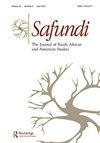Populism, privilege, and democracy in Henry James’s The Bostonians: encounters with community
IF 0.2
Q4 AREA STUDIES
Safundi-The Journal of South African and American Studies
Pub Date : 2020-07-02
DOI:10.1080/17533171.2020.1773051
引用次数: 0
Abstract
ABSTRACT Unusually for Henry James, The Bostonians (1886) addresses notions of “the people,” popular movements, and socio-political reform. Foregrounding the position of women, the narrative searchingly, if ambiguously, appraises conditions in the United States of the 1870s, following the Civil War. As Olive Chancellor (a Boston feminist) and Basil Ransom (a conservative Southerner) vie for possession of the malleable orator Verena Tarrant, the text explores the failure of “union” in both its personal and political senses. The populist-feminist rally concluding the narrative highlights the prevailing challenges to democratic possibilities. Community in its traditionally cohesive guise has metamorphosed into the “inoperative community” theorized by Jean-Luc Nancy. Mutually dependent, monadic “singularities” converge in tense encounter. “Community,” according to Roberto Esposito, inevitably separates such vulnerable “singularities” from themselves and others through the play of social relationality. The novel’s democratic orientation is nonetheless sustained by its capacious form and the hospitable engagement of its readers.亨利·詹姆斯的《波士顿人:与社区的相遇》中的民粹主义、特权和民主
1886年出版的《波士顿人》对亨利·詹姆斯来说是很不寻常的,他讲述了“人民”、大众运动和社会政治改革的概念。小说突出了女性的地位,对内战结束后美国19世纪70年代的状况进行了考察,虽然有些含糊。当奥利弗·钱瑟尔(一位波士顿女权主义者)和巴兹尔·兰森(一位保守的南方人)争夺能言善辩的演说家维伦娜·塔兰特时,本书从个人和政治两方面探讨了“联盟”的失败。民粹主义者和女权主义者的集会总结了这一叙述,强调了对民主可能性的普遍挑战。社区在其传统的凝聚力的伪装已经变成了“不起作用的社会”理论的jean - luc南希。相互依赖的单一“奇点”在紧张的相遇中收敛。根据罗伯托·埃斯波西托的说法,“社区”不可避免地通过社会关系的发挥将这些脆弱的“奇点”与自己和他人分开。尽管如此,小说的民主取向却因其广阔的形式和读者的热情参与而得以维持。
本文章由计算机程序翻译,如有差异,请以英文原文为准。
求助全文
约1分钟内获得全文
求助全文
来源期刊
CiteScore
1.00
自引率
0.00%
发文量
0

 求助内容:
求助内容: 应助结果提醒方式:
应助结果提醒方式:


